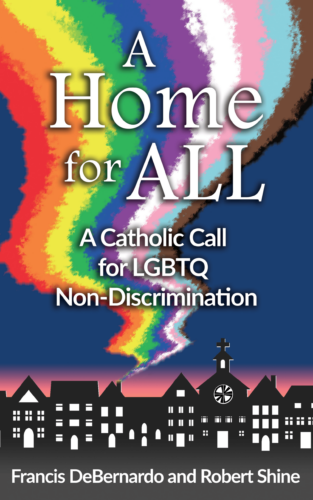A small white couch resides in my office at a Catholic high school outside Seattle. Students sit, nap and sometimes reveal their souls on this couch. One of the great privileges of my job as campus minister is the invitation into the spiritual lives of our students. What abundant delight, love, heartache, trauma, vulnerability and honesty these students greet us with each day. Countless stories of joy and pain, particularly from LGBTQ students, are told.
When it comes to providing spiritual care to our LGBTQ students, what is a Catholic high school to do? What spiritual care can a campus minister offer to LGBTQ students?
I have focused my research at Seattle University for the past five years on these two questions. Catholic schools with campus ministry programs have a unique opportunity to uphold the life and dignity of all students, particularly those on the margins. The following suggestions will help improve your campus ministry programs and affirm the life and dignity of all people, particularly LGBTQ teens.
1. Affirm our LGBTQ students
Catholic teaching primarily asks us to uphold the life and dignity of the human person. This means all people. As a church, our usually heteronormative language, assumptions and processes must be scrutinized so that we can see how discrimination negatively impacts our LGBTQ students. According to 2020 data reported by The Trevor Project, suicide is a leading cause of death among American youth, and LGBTQ young people are four times more likely to die by suicide than their heterosexual peers. A visible affirmation of our LGBTQ students will help save lives.
Suicide is a leading cause of death among American youth, and LGBTQ young people are four times more likely to die by suicide than their heterosexual peers. A visible affirmation of our LGBTQ students will help save lives.
Hearing stories from my LGBTQ students are the deepest heartache for me. The number of times a student has come out to me and shared either their pain or joy in the coming-out process are too numerous to count. Whether it’s a first-generation student who grew up in a devout Catholic family or a student who has renounced all religious belief, they wish to be accompanied on their journey and loved unconditionally.
Recently, a student asked me if their Sacrament of Confirmation “counted” because they were LGBTQ. Their question had many layers to it, including how they could be open and honest with their family and also be a truer version of themselves—a self they did not want to hide anymore. Another student sat on the couch and angrily asked me why no one told him about the teaching in the Catechism on homosexuality. He begged me to reconcile being “inherently disordered” with the unconditional love taught and shown to him by his family.
As campus ministers, we must demonstrate and share God’s unconditional love and affirm the life and dignity of our LGBTQ students.
2. Create welcoming and inclusive spaces for LGBTQ students
In a campus ministry office, spiritual care can occur at any point during the school day. Students may pop in for a five-minutes chat between classes, hang out for hours after school waiting for a retreat meeting or seek refuge while in crisis. As they navigate high school through their formative adolescent years, figuring out who they are, students experience a range of feelings and life experiences. Our hope is that they will graduate and move on to fully live the gifts God has given them in ways that will make our world a more peaceful and loving place.
When it comes to the spiritual care of LGBTQ students, visible signs, symbols and clubs matter. LGBTQ students feel safe (or safer) if your campus ministry office displays a rainbow flag. It shows your care and concern. I once heard a parent say that by having a rainbow flag in my office, I was encouraging and causing kids to become gay. I believe fear drives statements like these. Let’s challenge fear-based assumptions and create welcoming and inclusive spaces.
When it comes to the spiritual care of LGBTQ students, visible signs, symbols and clubs matter.
Offering support groups or LGBTQ clubs in the campus ministry office will help affirm the life and dignity of the human person. In some dioceses, there is not a specific club offered to LGBTQ students in Catholic high schools. Sixty-four percent of the schools I surveyed in Washington State said they had an LGBTQ support group or club, administratively sanctioned or not. Interviews with alumni from Catholic high schools confirmed that many LGBTQ kids are not actually “out” in high school. They are still emerging in their adolescence into who they are becoming.
The universal takeaway from these interviews was that all alumni wished they had been embraced and treated with respect and dignity, as opposed to the discrimination and exclusion they experienced. One alum I interviewed identified described the campus ministry office as “my first church at the school because I felt safe there. I could ask really interesting questions, and no one would judge me and say I was going to hell for asking questions. The campus ministers … seemed fearless and very graceful to have my presence.”
3. Ensure LGBTQ representation in the school
Can we please stop firing our professionally-trained and committed Catholic teachers and administrators because they are LGBTQ? We do not fire our divorced employees (and a whole host of other employees whose lives don’t fully conform with church teachings), so let’s stop demonizing good people living lives of servant leadership in our Catholic schools. Their presence offers a positive safety net to vulnerable students.
In my research, 20 percent of LGBTQ alumni from Catholic high schools in Washington State experienced the loss of faculty and coaches whose contracts (or covenants) were terminated due to their LGBTQ identity. One alumna, who currently works in a Catholic high school, shared her desire to see representation:
Can we please stop firing our professionally-trained and committed Catholic teachers and administrators because they are LGBTQ?
“I think it is so important to make kids know that every part of them is accepted and welcomed into a spiritual care space. I think one of the ways to do that is through visibility and representation modeling. Look, here’s a queer person in front of you in this spiritual care space,” she said.
4. Offer LGBTQ students retreats and student leadership opportunities
The alumni I interviewed shared the powerful spiritual experiences they encountered on retreat. Whether it was a first-year or leadership retreat, LGBTQ alumni felt inspired to be themselves, and to stretch their leadership and spiritual muscles. In an environment that seeks to build each person as a person for others, ministry programs offer a solid foundation.
The importance of retreats and leadership was affirmed by one LGBTQ alum I interviewed. “I got to see my classmates as human beings. Everybody was being vulnerable. I felt we were like the apostles and the disciples around campfires on the weekend. It was just amazing,” they said.
Witness talks and student leadership development can and will help your programming, especially inspiring LGBTQ students.
5. Train Catholic educators in diversity and inclusion issues
In my research, all the LGBTQ alumni from Catholic high schools in Washington, which included graduates from 1980 to 2020, reported they were not “out” in high school. All respondents reported they wished there was someone they felt safe talking to as students. Training Catholic educators with diversity, equity, inclusion and belonging (D.E.I.B.) initiatives can help to create safe spaces. To that end, faculty, staff and coaches must be willing to engage in difficult conversations.
As an extension of the church, every teacher, administrator, coach and staff member can become a touch point for students to experience God’s love.
When our worldviews are challenged, we often prefer to stay in our safe corners. As an extension of the church, every teacher, administrator, coach and staff member can become a touch point for students to experience God’s love. Some of us need to examine our biases to more deeply understand that our willingness (or unwillingness) to embrace pronouns, challenge assumptions and create spaces where students feel safe can positively or negatively impact a student’s life.
Catholic teaching includes many beautiful encyclicals and pastoral letters that uphold the life and dignity of the human person. To live out these teachings, campus ministry programs must broaden their efforts to provide spiritual care for our LGBTQ youth. These students’ lives depend on our willingness and ability to meet them where they’re at, to not be afraid and to continue to build the community of God.




